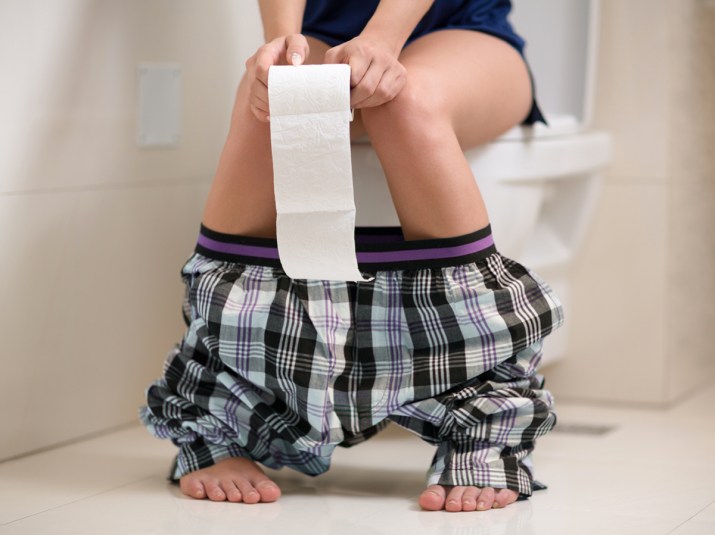Doctor Advice on Blood Pressure, Mystery Rashes, and Feeling ‘Backed Up’

Cindy Geyer, MD, is the Medical Director at Canyon Ranch Wellness Resort in Lenox, Massachusetts, and a faculty member at The Center for Mind-Body Medicine in Washington, DC. Below she answers health questions from readers. (To ask her a question, send an email to health@firstforwomen.com.)
Q: Over the past few weeks, I’ve been increasingly constipated and feeling bloated and miserable. I tried adding more fiber to my diet, but that only made it worse. Help!
A: I’m sorry to hear about your discomfort.
There are many causes of constipation, but at this time of year, I always suspect one that’s often overlooked: dehydration. The summer heat generally causes an uptick in perspiration, which diverts liquid from the GI tract. And lack of water in the digestive system means harder stools and less lubrication to move them through, triggering constipation. What’s more, studies show that 74 percent of women don’t drink enough water, making them prime targets for dehydration — and GI backups. Adding fiber is great in theory because it softens and bulks up stool, but without enough water in your intestines, the fiber also hardens, worsening constipation.
To get things moving, I advise taking a single 200 mg. dose of magnesium citrate. It works like a laxative, pulling water into the colon and relaxing muscles in the GI tract. It should trigger a bowel movement within an hour or two.
Just be sure to take it at least an hour before or after any medications since the mineral can impact the effectiveness of some prescription medications.
Then, to ensure you’re hydrated and ward off future bouts of constipation, I suggest drinking eight 8 oz. glasses of water a day and loading up on the season’s fresh produce, like watermelon, cucumbers, celery, cantaloupe, and strawberries. These foods are rich in gel water, which has a consistency between a solid and a liquid and helps cells hydrate more efficiently.
Hint: A daily smoothie can ensure you’re getting enough. But if you don’t see results after two to three weeks, I suggest making an appointment with your primary care provider to discuss the issue
Q: My friend said she stopped using mouthwash when she heard it can raise blood pressure. I have a family history of high BP. Should I stop too?
A: There’s one common mouthwash ingredient behind the blood pressure risk — chlorhexidine. The chemical halts the production of nitric oxide, a molecule that helps keep arteries relaxed, and scientists at the University of Texas Health Science Center at Houston found that people with lower levels of nitric oxide had higher blood pressure.
Although the risk that chlorhexidine will raise blood pressure is small (8 percent), it’s still worth finding a brand that’s free of the ingredient, like Tom’s of Maine (3 pack for $21.56, Amazon), since high blood pressure runs in your family.
You could also skip mouthwash altogether and use a tongue cleaner to scrape your tongue daily. Ayurvedic practitioners have been recommending this strategy for centuries, and studies show it can reduce levels of harmful bacteria that cause bad breath and gum disease by 75 percent.
Q: Last Sunday, I got a blistering, itchy rash on my hand, and I have no idea why. I hadn’t done much except meal prep for the week and spend time in the yard. What could this be?
A: If you used lemons, limes or celery in your meal prep, you may be dealing with phytophotodermatitis, a condition in which a compound in these foods (psoralen) makes your skin light-sensitive.
For people with the condition, sun exposure within 24 hours can trigger an inflammatory sunburn-like rash with the potential for blistering and itching. The rash, often called “margarita dermatitis” because of its link to lemons and limes, will go away on its own, but it can take a week or two.
I suggest applying a layer of calendula like Boiron Calendula Cream ($8.99, Amazon) to the area a few times a day — its anti-inflammatory properties can help soothe a rash. And to prevent a recurrence, be sure to wash your hands thoroughly after handling any citrus. But if you have severe blistering, oozing or itching, see your primary care provider for targeted treatment.
This story originally appeared in our print magazine.
We write about products we think our readers will like. If you buy them, we get a small share of the revenue from the supplier.
More From FIRST
How ‘Micro-Stressors’ Are Sabotaging Your Health — And What to do About It
What the Heck Is a ‘Complicated’ Yeast Infection?
Tired? There Might Be a Hidden Chemical Sapping Your Energy
















